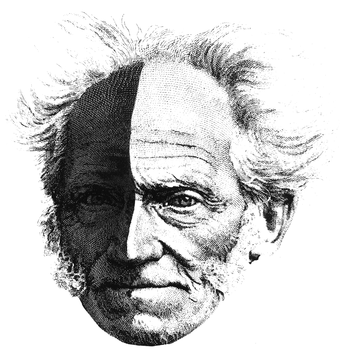Arthur Schopenhauer1788–1860
Schopenhauer shared with Thomas Hobbes (1588-1679) a pessimistic view of human nature, but he posited the source within the individual: he exposed the dark side of humanity. Hobbes saw people at war with one another, whereas Schopenhauer considered that they were at war with themselves. For him, the internal ferment is fuelled by irrational motives that far exceed our ability to control them. His is a philosophy of the irrational in contrast to the prevalent rationalism adopted by his predecessors. It is this appeal to the irrational and unconscious that is of such importance in the development of psychology, and his philosophy shares many features with Freud’s theories. His views were expressed at an early age in his book The World as Will and Idea (1818). Schopenhauer was influenced by both Goethe and Kant, accepting some of their concepts and rejecting others; he was also inspired by Eastern philosophy. He followed Goethe in developing a theory of colour vision. With Kant he accepted that reality (the thing-in-itself) is unknowable, but it consisted of an all-pervading will, of which individual wills are constituent parts. The motive force for the individual will is the struggle to survive. Rather than being under the control of the intellect, rational thought is subservient to the will, which is driven by irrational forces. Life is considered to be a succession of blind impulses, like hunger and sexual desire, that are temporarily satisfied, only to return. Pleasure, the satisfaction of an impulse, is transitory: “No attained object of desire can give lasting satisfaction, but merely a fleeting gratification”. Understanding the power of the will only amplifies the suffering it imposes. This dire state of affairs can best be ameliorated by immersion in some activity that is not driven by the will, like art. The power of sexual desire can be reduced, he argued, by leading an ascetic life. Schopenhauer was born in Danzig and moved to Hamburg at the age of five. He was educated at Göttingen and then Berlin University, where he commenced as a lecturer in 1819. In an act of impressive arrogance he timed his lectures to coincide with those of the eminent philosopher Georg Hegel (1770-1831), intending to lure the latter’s students away. The failure of this enterprise resulted in him retiring from academic life and retreating to Frankfurt, where he remained as a bachelor for the rest of his life. He wrote that “Marriage is a trap which nature sets for us”. In other respects, an ascetic life might have been the best that one could achieve from Schopenhauer’s philosophy, but it was not a path that he himself sought to follow. His writing is replete with oppositional pairs like life and death, pleasure and pain, love and hate, and his portrait has been transfigured to display this conflict between positive and negative aspects of human endeavour.
